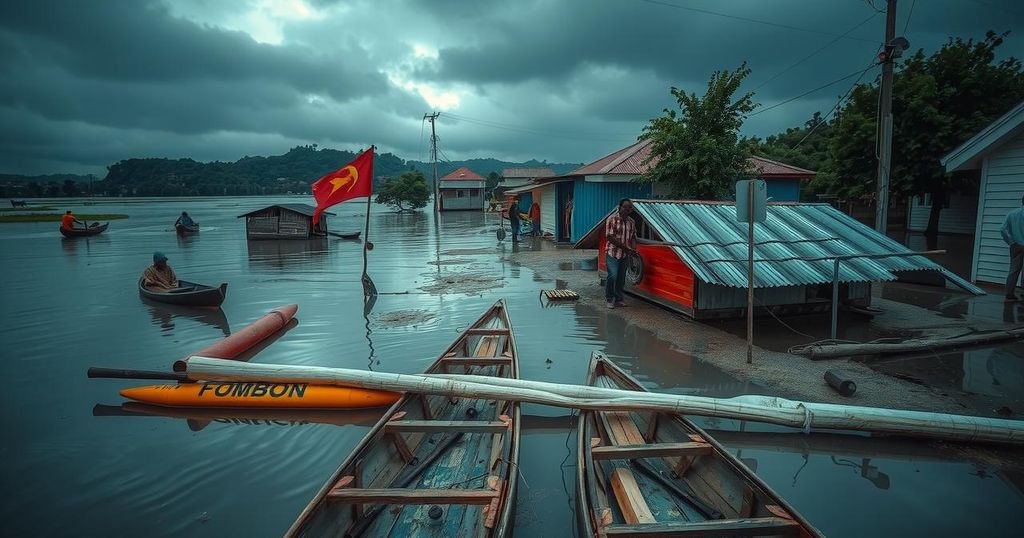Floods exacerbated by climate change have severely impacted Africa, particularly in Kogi State, Nigeria, causing destruction, displacement, and jeopardizing food security. In 2024, approximately 6.9 million people have been affected across West and Central Africa, highlighting the urgent need for global action to combat climate change and reduce greenhouse gas emissions.
In the central Nigerian town of Lokoja, floods have relentlessly plagued homes, particularly that of 67-year-old Idris Egbunu, for over a decade now. Each rainy season, the Niger River swells, inundating his residence and forcing him to undertake extensive repairs before the cycle returns. This scenario reflects a broader crisis across vast regions of Africa, where climate change has severely disrupted weather patterns, leading to more catastrophic flooding events than ever before. In 2024 alone, nearly 6.9 million residents in West and Central Africa have been adversely affected by abnormal torrential rains and acute flooding, as reported by the United Nations Office for the Coordination of Humanitarian Affairs. The situation is particularly dire in Kogi State, Nigeria, which has seen intensified flooding since 2012. Last year marked the most devastating floods in a decade, resulting in over 500 fatalities and displacing approximately 1.4 million individuals. Emergency response officials, like Sandra Musa, advisor to the Kogi State governor, have indicated that this year’s floods have yet to reach the devastating levels of 2022, although she admits that the current conditions are “very, very bad.” Meanwhile, locals like Fatima Bilyaminu, a shopkeeper from the Adankolo district, find that they can only access their homes by boat due to rising waters, which threaten their possessions and livelihoods. The repercussions of these floods extend beyond localized damages, threatening food security in a continent that contributes merely 4% to global greenhouse gas emissions, yet bears the brunt of climate disasters. According to Aida Diongue-Niang of the UN’s Intergovernmental Panel on Climate Change, the current rainfall is unprecedented, illustrating the adverse impacts of climate change. Evidence from various African nations highlights the alarming scale of disruption: in Chad, recent floods have killed over 576 individuals and affected nearly two million people. Similar devastation is reported in Cameroon, where torrential rains have obliterated homes and destroyed agrarian livelihoods. Urban areas are not immune; cities like Bamako, Guinea’s capital Conakry, and Monrovia are experiencing severe inundation, aggravating public health and sanitation issues. Evidently, the transition from a decadal cycle of floods to an annual crisis signifies a troubling trend that experts predict will persist if fossil fuel consumption continues unabated. Respected authorities call for a reevaluation of urban expansion in vulnerable regions and underscore the imperative of controlling greenhouse gas emissions to mitigate extreme weather events. The gravity of the situation necessitates unified global action to address the ambitious challenges posed by climate change.
The article discusses the increasing frequency and severity of floods in Africa, attributing them to climate change. It highlights personal accounts of individuals affected by the flooding, statistics indicating the scale of the crisis, and expert opinions emphasizing the urgent need to address greenhouse gas emissions. The focus on Kogi State, Nigeria, serves to illustrate the broader implications of climate-related disasters across the continent, affecting millions of lives and threatening food security. The piece also mentions efforts from various nations in response to these challenges and the call for coordinated global actions.
In conclusion, the severe flooding experienced in Africa is intricately linked to the detrimental impacts of climate change, exacerbating vulnerabilities across the continent. With millions affected and the threat to food security looming large, urgent measures are necessary at both local and global levels to mitigate these catastrophes. The emphasis on reducing greenhouse gas emissions is paramount in preventing further climate-related disasters, making it a collective responsibility of humanity to instigate meaningful change to combat this growing crisis.
Original Source: phys.org






